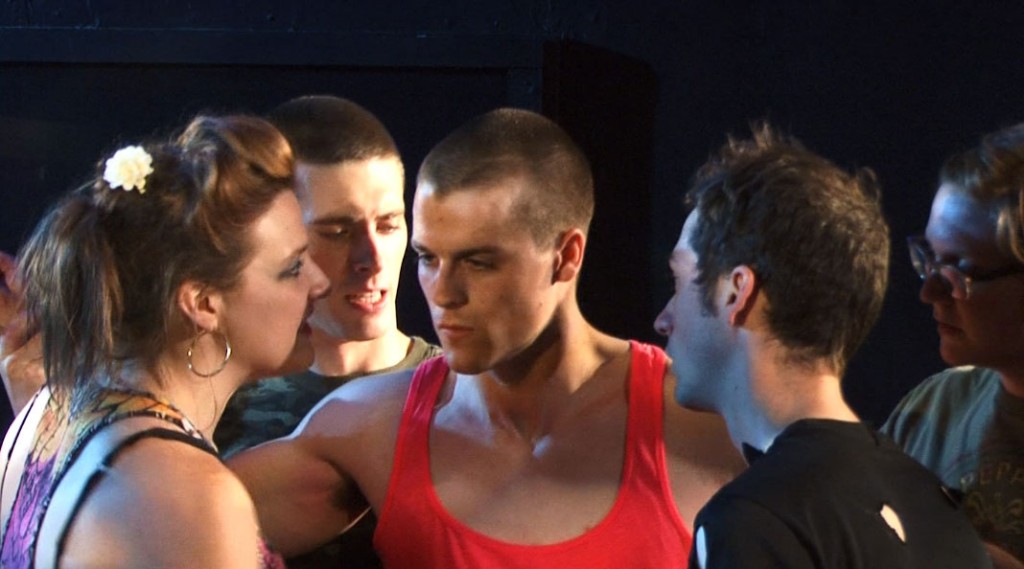Theater Review: An Energetic But Erratic “Polaroid Stories”
My impression is of a trio of rough-but-ready theater groups spoiling for some nervy, in-yer-face theatrical action. That is the way it should be.
Polaroid Stories by Naomi Iizuka. Directed by Joey C. Pelletier and Elise Weiner Wulff. Presented by the Happy Medium Theatre Company, Boston Actors Theater, and Heart & Dagger Productions, at the Boston Center for the Arts, Plaza Black Box, through July 14.
By Bill Marx
 The kids are all right, but I am not so sure about our theater critics and perennial Stage Door Larry. Dramatist Naomi Iizuka’s self-consciously “poetic” mash-up of Greek myths and homeless youth is too problematic and static an evening of drama to warrant critical sales yammer of the “riveting” and “haunting” variety. Still, three small, local companies collaborate to create a heartening production that bodes well for the future—lots of promising talent on display, frisky performers worthy of genuine roles rather than Iizuka’s monomaniacal attitudes. What’s more, on the night I attended, the audience was young and ready to be engaged, a welcome contrast to the older crowd’s demand that it be amused—if not to death, at least to a state of worth-the-money relaxation.
The kids are all right, but I am not so sure about our theater critics and perennial Stage Door Larry. Dramatist Naomi Iizuka’s self-consciously “poetic” mash-up of Greek myths and homeless youth is too problematic and static an evening of drama to warrant critical sales yammer of the “riveting” and “haunting” variety. Still, three small, local companies collaborate to create a heartening production that bodes well for the future—lots of promising talent on display, frisky performers worthy of genuine roles rather than Iizuka’s monomaniacal attitudes. What’s more, on the night I attended, the audience was young and ready to be engaged, a welcome contrast to the older crowd’s demand that it be amused—if not to death, at least to a state of worth-the-money relaxation.
Polaroid Stories attempts to fuse interview material garnered from youth-at-risk with Greek myths, the emphasis on Ovid’s Metamorphosis and its exploration of the magical and manic transmutations of love, the destructive blows of desire. The challenge for a dramatist is—via the modernist mode of T. S. Eliot, etc.—to dovetail poetic metaphors of the past with the dissolute grit of contemporary reality. To simultaneously heighten and flatten myth. In her clumsy version of a strung-out adolescent Waste Land, Iizuka figures it is enough to lump the two extremes together, assuming that the arch juxtapositions will do the theatrical work for her. For example, the throne of the King of the Underworld is a toilet, which houses his drug stash. References to “the river of forgetfulness,” announcements by characters that they are a “god,” fill-in dialogue offering background info on the myths referred to in the play fall into the same category—the effect is to create an awkward world that has one name-dropping foot in archetypes, the other in . . . the toilet.
In other words, the play never becomes sufficiently realistic to move us because of its raw depiction of lost, young lives, but it also lacks the rich and wild lyricism of Ovid, unless watching a woman in white (our stand-in for Philomel) flouncing about the action singing “Blackbird” casts a “riveting” spell. Worse, by its very nihilistic nature the drugged-out underworld that traps Iizuka’s figures negates the possibility of meaningful love (“Fuck Nice!”), though there is plenty of mindless obsession and addiction. In Ovid, love is magnificently evoked only to be lost. Here there is little variety in the sad march of disillusionment conveyed through despairing monologues and duologues. We know how the stories of Philomel, Orpheus, Eurydice, Narcissus, and Echo end—the challenge is bring us along in surprising ways, to play imaginatively with the possibilities. Having somebody kick Orpheus’s guitar or handing Eurydice a knife doesn’t do it. And lugging in post-modern gab about the relativity of stories doesn’t help either.
To me, the play’s focus on the destruction of love is puzzling. The spiritual homelessness of these characters raises fascinating issues about identity, meaning, and family dynamics: the tragicomic world of Euripides, his confused Electra and Orestes hurtling toward absurdity and incest, might have been a more effective mythic filter for this story of terminal teen drift in the lower depths. In the world of Iizuka’s play, a nurturing love that never existed in the first place inevitably fails—a well-worn lesson that is spelled out over and over and over again in the eventually tiresome Polaroid Stories.

POLAROID STORIES: Kiki Samko, Luke Murtha, Michael Underhill, Elizabeth Battey, and Michael Caminiti. Photo: Heart & Dagger Productions
Given the considerable limitations of the script, the production holds your attention by way of the compelling energy and enthusiasm of its performers. Not a lot of finesse, reserve, and modulation here (myth generally gives actors license to emote big), but the theatrical propulsion is impressive if fatiguing after two hours. As an amnesiac Eurydice, Melissa DeJesus gets a crack at the script’s most complex dramatic arc, modulating from a befuddled street promiscuity to a fierce, inhumane anger. The actress makes the most of the elaboration, adding nice flickers of self-conscious disgust throughout, though her depiction of the final act of love and hatred falls short. Kiki Samko, as Persephone, also proffers a memorably passionate disdain for love.
The other performers tackle their figures with vim and vigor. Mikey DiLoreto’s God of the Underworld could use more hypnotic menace, but he supplies plenty of sardonic and seamy pizazz. Jesse Wood is a commanding masculine presence as G, while Michael Underhill brings plenty of exhibitionist self-hatred to Narcissus. Elizabeth Battey’s seemingly innocent Echo turns on her hollow idol with satisfying venom. Luke Murtha’s Orpheus is satisfyingly if one-note; Robyn Linden’s Semele is nicely wistful. Danielle Leeber Lucas’s hither-and-yon Philomel is far too precious an allegorical figure, though I suspect that is what the script calls for.
Directors Joey C. Pelletier and Elise Weiner Wulff keep the set minimal, move the large cast around with spry dexterity, and use lighting effectively (though with occasional clichés, such as the use of flashlights). My impression is of a trio of rough-but-ready theater groups spoiling for some nervy, in-yer-face theatrical action. That is the way it should be—next time let’s hope that they pick more exciting and complex dramatic stories to pour their ardor into.
Bill Marx is the editor-in-chief of The Arts Fuse. For over three decades, he has written about arts and culture for print, broadcast, and online. He has regularly reviewed theater for National Public Radio Station WBUR and The Boston Globe. He created and edited WBUR Online Arts, a cultural webzine that in 2004 won an Online Journalism Award for Specialty Journalism. In 2007 he created The Arts Fuse, an online magazine dedicated to covering arts and culture in Boston and throughout New England.
Tagged: Boston Actors Theater, Happy Medium Theatre, Heart & Dagger Productions, Naomi Iizuka
